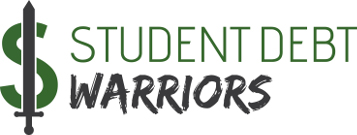This post may include affiliate links. Please read the disclosure at the bottom of our “About” page to learn more about our affiliate program.
If you had to rely on student loans to afford college, then you know just how hard it can be to pay them back—and how terrifying it can be when you realize that you have tens of thousands of dollars of debt with no way of paying it back. There is a sense of dread that comes with that realization, a deep, sinking feeling in your soul, and a question: How will I ever pay off my student loans?
Believe me, I know how this feels. I graduated from college in 2011 with more than $60,000 in student loan debt and struggled to find a job for my first two years out of school. That led to a number of deferments and forbearances, and that led to a lot of interest capitalization, driving my balance up even higher. On top of that, half of my student loans were taken out in 2007 and 2008, when interest rates were extraordinarily high (we’re talking 6.8–8%)—meaning that when I finally did get a job that allowed me to start making payments, nearly all of it was going to interest.
Need help keeping track of your student loans? Download our free Student Loan Spreadsheet!
My balance wouldn’t budge, and I had no idea what to do. Whenever I thought about my student loans, I would descend into a panic. I will never pay these off.
And I truly believed that. I believed that I would never be debt free, that my student loans would forever hang over my head, preventing me from starting a family or buying a house or having any kind of life. I believed that I would need to do something absolutely crazy if I wanted to pay off my student loans.
And I almost did.
My Crazy Student Loan Repayment Story
In 2016, I had been actively making payments on my student loans for three years. Knowing that I needed to pay more than my minimum monthly payment if I ever wanted to pay my loans off in a timely manner, I did my best to pay extra each month. At a minimum, I added $50 to my payment every single month. Beyond this, whenever I managed to save up a few hundred dollars, I’d make a single larger, one-time payment to pus my balance lower.
Over those three years, I had managed to make a real dent in my student loans. My balance had fallen from just over $60,000 to around $45,000. Still a ton of debt, but every time I looked at my balance and saw how much I’d paid down thanks to hard work and dedication, I was proud. At this rate, I’d have my loans paid off by 2020—three years ahead of schedule! Not the fastest, but certainly not too shabby.
And then I lost my job in a round of layoffs.
If you asked my friends and family how I handled the layoff, they’d probably say that I handled it better than expected. But however calm, cool, and collected I may have looked and acted, on the inside I was boiling over with panic and desperation.
I had a few thousand dollars saved up, which would be enough to float my student loan (and other expenses) for a few months. I had a handful of freelance clients who could send some cash my way. In a worst-case scenario, I had unemployment that I could claim, and I had deferment options that I could leverage to stop making payments on my student loans for a little while if need be.
The point is, I would have undoubtedly survived this period of unemployment. But the worst-case scenario—placing my student loans in deferment or forbearance—terrified me, because it would mean giving up all of the progress that I had made in paying off my student loans.
Though many of my student loans were subsidized, just as many of them were unsubsidized. That means that during periods of deferment and forbearance, most of my student loans would continue to accrue interest while I was not making payments. And if I couldn’t pay off the accrued interest when deferment (or forbearance) ended, then it would capitalize. It would be added to my balance, where it would begin to accrue its own interest. As little as six months of deferment could have meant seeing my balance balloon by hundreds of dollars. A year would mean thousands of dollars.
It was very possible that I could forfeit all of the progress that I’d made and be forced to start over.
And that terrified me. I refused to go back to having $60,000 in student loans. I refused to starting over. And so, while I continued making my minimum monthly payments from a mix of my freelance income and my emergency savings, while I looked for job openings, I also looked for ways that I could quickly pay down my student loans. I was looking for a magic bullet that would take away the monster of student loans forever.
During my months of unemployment, my journey to magically pay off my student loans instantly led me to ask Google searches like “how to make a lot of money fast” and “need money now.” Some of the suggestions I found in forums and blog posts were decidedly dark—sell an organ, rob a bank, etc.—but one of the suggestions seemed to make sense. I could sign up to participate in clinical trials for newly-developed drugs.
Becoming a Guinea Pig to Pay Off My Student Loans
Every time a pharmaceutical company develops a new drug, it has to go through a number of rounds of stringent testing in order to prove that it is a beneficial and effective treatment. Naturally, a part of that will include testing the drug on humans. This is called “clinical testing,” and subjects can earn a lot of money by signing up for the right tests.
I was lured in by the siren song of easy money, money that I could use to pay off my student loans even faster. I can earn thousands of dollars just by taking a few pills? Where do I sign up?
Ultimately, I signed up to be notified of any studies conducted by Pfizer, whose clinical labs are conveniently located in New Haven, CT (which is essentially my backyard).
I was called within a week and told of a study that was short on subjects. The drug being tested was developed to treat Lupus; it would involve staying over night in the labs for 7 nights; I would need to pass a medical screening ahead of time; and I would be paid $7,000 for my troubles.
Talk about a deal.
I agreed to go through the phone screening, answering questions about my health. I agreed to participate in the medical screening, having my blood drawn and peeing into a cup. I just kept thinking about that money. $7,000—all for doing nothing. It wasn’t until the 2-hour mandatory info session that I realized exactly what that “nothing” entailed.
The purpose of this phase of testing was to help the researchers discover the “upper tolerable dose” of the drug in question. In other words, unless I lucked out and was in the placebo group, they wanted to inject me with a huge dose of the drug (8 times higher than previous phases of the study) in order to see how my body reacted. In earlier phases, possible side effects included heart arrhythmias, fainting spells, and a slew of more minor inconveniences. In this phase, the side effects were unknown, but death or serious harm was not out of the question.
When they handed me the contract to sign, I thought about it. I thought about it hard. And I was truly considering doing it.
I ultimately walked away without signing the contract, deeply shaken that I had considered putting my life at risk testing an experimental drug for a measly $7,000. (I was also deeply shaken by the number of people who decided to stay and sign the contract, the people who had fewer options than me.)
Did I truly think that my life was worth as little as $7,000? No, absolutely not. But the thought of starting from scratch paying down my student loans—the thought of paying them for another ten, or twenty, or twenty-five years—terrified me. My student loans made me so desperate that $7,000 actually seemed worth it.
Shifting Gears
I walked away from that clinical trial and ultimately found a new job a few months later. In the year and a half that followed, I vowed that I would never allow myself to become so desperate ever again.
So I doubled down on my efforts. I cut my expenses as much as I could (you can read some articles that I wrote for Grow Magazine on that subject here, here, and here), expanded my freelance business to nearly double my salary, and poured every cent that I could into paying down my debt. Today, five years after I began paying back my $60,000 in student loans, my student loan balance sits at $13,000, and I’m on track to finish paying them off completely by the end of 2018. And I didn’t have to sign up for a medical study or sell an organ or write a best-selling book to do it.
Author’s note: As of January 2020, I officially finished paying off my student loans! While it took longer than I had originally planned, I couldn’t be happier!
You Don’t Need to Be Desperate!
The truth is, however hopeless you may feel now, you don’t need to do anything crazy to be able to pay off your student loans.
You know what it took for me to begin truly crushing my college debt? I stopped panicking, stopped dreaming up magical scenarios that would allow me to pay off my student loans all at once, and created a plan with small, concrete, achievable steps.
With a few simple steps, you can begin to take control of your finances and begin taking the baby steps towards a life free of student loans:
- Make sure you’re tracking your student loans so you always have the information you need when you need it.
- Choose a student loan repayment plan that works for your unique financial situation.
- If you don’t have one, create an emergency fund so you don’t fall deeper into debt if an unexpected expense strikes.
- Whenever possible, pay extra on your loans to pay them down faster.
- If you think you can get a lower interest rate (score!) then consider refinancing your student loans.
- Don’t forget to plan for your future.
What’s Your Story?
Have you ever done something crazy (or considered doing something crazy) on order to pay off your student loans? We want to hear about it! We’re compiling a list of all of the crazy, scary things that students have done (or come very close to doing) in order to pay off their student loans.







I know these feelings too too well. Except mine weren’t $60k, it was a third of that but I still freaked out the same. Great tips! Extra payments are always good.